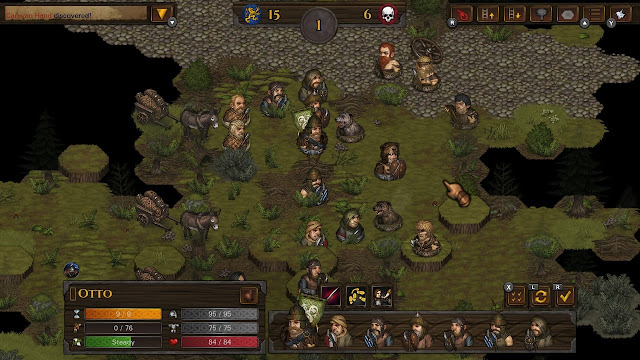I’m all for games being complex, challenging, and unforgiving. Just this week I reviewed a simulation title, in A-Train, that comes dangerously close to being a genuine degree in urban planning and an MBA, rolled into one. But, if you are going to go down the route of unforgiving complexity, the least you can do is make sure there is an adequate tutorial and learning curve to give players a chance. Battle Brothers is going to lose a lot of potential fans because it point-blank refuses to teach them how to play.
What is being called a “tutorial” in the game just… isn’t, really. And the “tutorial” quest is more than happy to destroy the player’s armies. The easiest of the “proper” quests will often throw near-impossible battles at new players that won’t understand why they’ve ended up in the mess. So many of the game’s critical underlying systems are so obtuse and not immediately apparent that I didn’t even notice that there was cheap equipment for low-level characters until someone in my first-play stream explained it to me… I’d been struggling to buy the premium stuff that I just didn’t need at that stage of the game from the weaponsmiths. I’m not new to RPGs, tactics games, strategy, or any other genre Battle Brothers is adjacent to, and this game required a lot of early-stages guesswork from me as to how it works. Throw in a pretty clumsy interface on the Nintendo Switch that likes throwing big blocks of text at you to wade through everywhere that you point the cursor, and I don’t think I’ve ever come across a game so openly hostile to new players.
Where Mount & Blade’s action plays out in real-time, in Battle Brothers it’s turn-based, and complexly so. Placement of units on advantageous terrain is critical to success, as is the way that they’re equipped, as it can affect the special attacks and support abilities that they have access to. In addition, units can be perma-killed or injured in such a way that it takes a long while to heal, and each character in the band gains experience and levels up (which you also control, in terms of stat boosts). People who are into micro-managing in RPGs or strategy games will love the granular control they have over the formation of their armies, though it can become a time-consuming process in the late game, again made cumbersome thanks to the poor interface optimisation on Switch. It also doesn’t help that combat can quickly become a mess, because moving the cursor over a character or special ability icon will pop up one of those boxes with a lot of numbers and words to describe the special ability, and in doing so hide most of the actual combat. You can turn those boxes off, but when you do that you can no longer see the description and impact of the ability that you’re about to use, which isn’t helpful when it’s not yet familiar to you. All of this would work on PC, where there’s more screen real estate and the descriptor boxes can take up a smaller percentage of the space. Here, though, it’s almost unmanageable to make strategic decisions while dealing with a million pop-up boxes wherever you shift the cursor.
Once you get the hang of Battle Brothers, though, it’s very difficult to put it down. It depicts a grim world that makes Game of Thrones seem flowery, and spares no expense in depicting the harsh realities facing scrappy mercenary bands in a dark ages like this. Even on the lowest difficulty setting, survival feels like a reward in itself, and even as the prestige of the band grows, you just know that you’re always one bad battle away from losing your most precious, irreplaceable veterans and leaving the band a shell of its former self. Though the little icons that represent your soldiers on the battle map aren’t the most detailed or interesting, they are all distinct from one another enough that you’ll recognise them in the heat of the battle. Your heart will skip a beat or two where your carefully levelled-up hero has been surrounded on all sides by enemies. Conversely, you’ll also become uncomfortably comfortable with recruiting some real dregs (who all have little background stories) to act as meat shields and blunt the first wave of enemy attacks. It’s a strategy that works all-too-well.
Thanks to a lot of DLC Battle Brothers is expansive in scope. The base game isn’t so costly (and still has plenty of scenarios to play through), but the DLC adds all kinds of new factions and settings to the mix. I bought it on day one because there’s a “Middle Eastern” themed DLC, and as I’ve mentioned a number of times in the past, I love the 1001 Arabian Nights aesthetic and storytelling tradition. I was very much looking forward to getting my scimitar-wielding mercenary bands together. Unfortunately, that wasn’t to be as the DLC doesn’t do nearly enough to distinguish the stories being told, the aesthetics or the storytelling. It adds a lot in the sense that there are new locations and enemies to fight, and even arenas to participate in duels… but it also doesn’t add nearly enough variety to the experience, and has been a little disappointing as a consequence.









